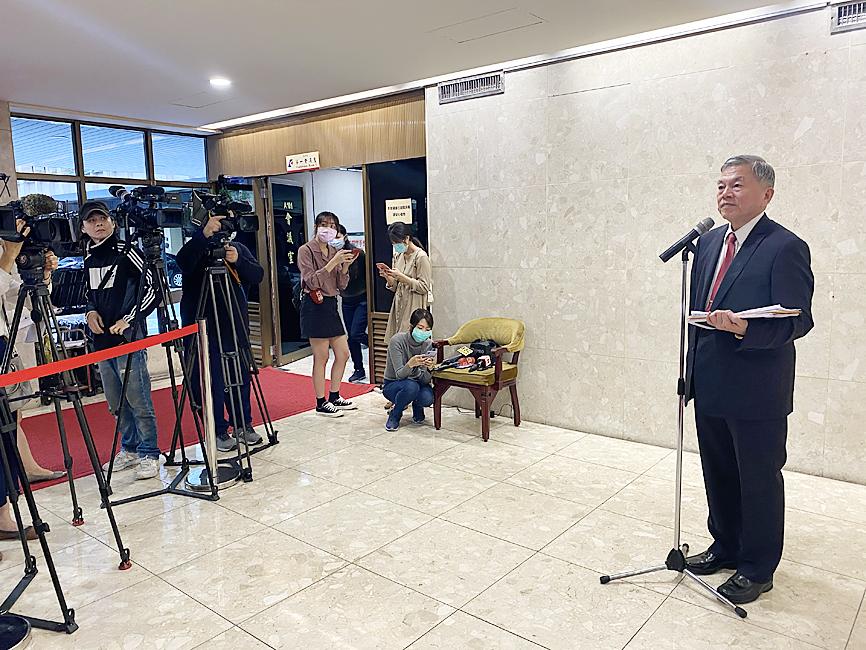Minister of Economic Affairs Shen Jong-chin (沈榮津) yesterday proposed issuing vouchers for use on e-commerce platforms to boost the nation’s economy.
“Domestic firms are facing a downturn in business due to the COVID-19 pandemic, as consumers have been avoiding going out and have [subsequently] reduced shopping [activities],” Shen told reporters following a meeting with local businesses, while suggesting stimulating the market through the vouchers.
Emphasizing that discussions on the matter are still at a preliminary stage, Shen said that the Ministry of Economic Affairs could subsidize the issuance of 20 to 25 percent vouchers by e-commerce platforms.

Photo: Huang Pei-chun, Taipei Times
Unlike the ministry’s previously announced stimulus coupons, which are to be issued six to 12 months after the virus crisis abates, Shen said that the online vouchers could be issued earlier and be funded by a NT$40 billion (US$1.32 billion) budget proposed by the government.
The ministry said that it plans to spend up to NT$207.4 billion on public infrastructure projects by the end of this year.
While the ministry has striven to stimulate economic activity, domestic businesses, particularly those in the information and communications technology (ICT) industry, have been voicing growing concerns about overseas orders as the pandemic causes volatility on international markets.
“[Although] overall production has resumed in China ... ICT firms fear a potential decline, as order visibility remains very low for next quarter,” Shen said, but added that some companies have nevertheless benefited from transferred orders.
Another significant challenge for local firms is growing market competition from South Korea, he said, citing as an example depreciation of the South Korean won against the New Taiwan dollar.
Shen, who is on the central bank’s board of directors, promised to shed light on the matter.
The ministry has also been providing assistance by reducing utility rates and helping to negotiate more flexible work hours for the ICT industry’s foreign workers, he said.
“We also plan to delay rent payments for companies with manufacturing facilities in industrial parks for up to one year,” Shen said, adding that the policy would also apply to land leased from state-owned Taiwan Sugar Corp (台糖).
However, any delay in rent payments for facilities in science parks would be decided by the Ministry of Science and Technology, he added.

CHIP RACE: Three years of overbroad export controls drove foreign competitors to pursue their own AI chips, and ‘cost US taxpayers billions of dollars,’ Nvidia said China has figured out the US strategy for allowing it to buy Nvidia Corp’s H200s and is rejecting the artificial intelligence (AI) chip in favor of domestically developed semiconductors, White House AI adviser David Sacks said, citing news reports. US President Donald Trump on Monday said that he would allow shipments of Nvidia’s H200 chips to China, part of an administration effort backed by Sacks to challenge Chinese tech champions such as Huawei Technologies Co (華為) by bringing US competition to their home market. On Friday, Sacks signaled that he was uncertain about whether that approach would work. “They’re rejecting our chips,” Sacks

NATIONAL SECURITY: Intel’s testing of ACM tools despite US government control ‘highlights egregious gaps in US technology protection policies,’ a former official said Chipmaker Intel Corp has tested chipmaking tools this year from a toolmaker with deep roots in China and two overseas units that were targeted by US sanctions, according to two sources with direct knowledge of the matter. Intel, which fended off calls for its CEO’s resignation from US President Donald Trump in August over his alleged ties to China, got the tools from ACM Research Inc, a Fremont, California-based producer of chipmaking equipment. Two of ACM’s units, based in Shanghai and South Korea, were among a number of firms barred last year from receiving US technology over claims they have

BARRIERS: Gudeng’s chairman said it was unlikely that the US could replicate Taiwan’s science parks in Arizona, given its strict immigration policies and cultural differences Gudeng Precision Industrial Co (家登), which supplies wafer pods to the world’s major semiconductor firms, yesterday said it is in no rush to set up production in the US due to high costs. The company supplies its customers through a warehouse in Arizona jointly operated by TSS Holdings Ltd (德鑫控股), a joint holding of Gudeng and 17 Taiwanese firms in the semiconductor supply chain, including specialty plastic compounds producer Nytex Composites Co (耐特) and automated material handling system supplier Symtek Automation Asia Co (迅得). While the company has long been exploring the feasibility of setting up production in the US to address

OPTION: Uber said it could provide higher pay for batch trips, if incentives for batching is not removed entirely, as the latter would force it to pass on the costs to consumers Uber Technologies Inc yesterday warned that proposed restrictions on batching orders and minimum wages could prompt a NT$20 delivery fee increase in Taiwan, as lower efficiency would drive up costs. Uber CEO Dara Khosrowshahi made the remarks yesterday during his visit to Taiwan. He is on a multileg trip to the region, which includes stops in South Korea and Japan. His visit coincided the release last month of the Ministry of Labor’s draft bill on the delivery sector, which aims to safeguard delivery workers’ rights and improve their welfare. The ministry set the minimum pay for local food delivery drivers at